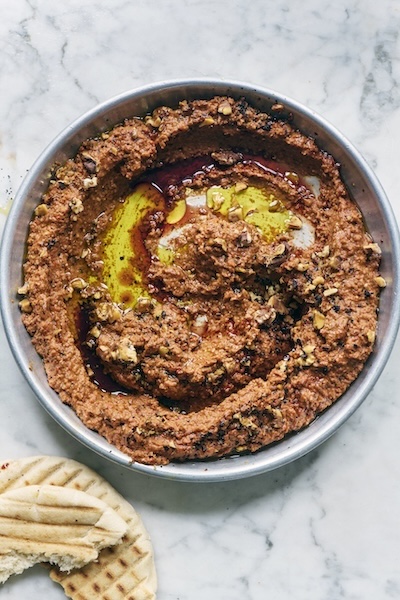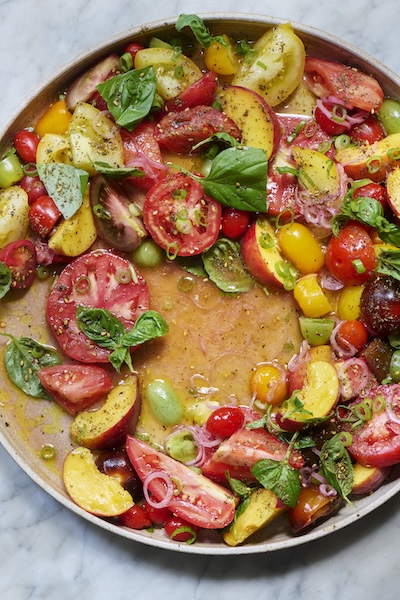Arabica – Small Plates Big Connections – Wouldn’t it be lovely to have a cook book that celebrates the vibrant flavours of the Eastern Mediterranean – whisking you on a culinary journey through the fertile valleys, mountain villages, coastal towns, and vibrant cities of Lebanon, Syria, Jordan and Turkey? Well, there is, and it’s called Arabica, and with all our gorgeous Mediterranean food shops springing up, you’ll be able to buy the ingredients easily. But if you don’t have a store handy, you can visit the Arabica website, where a host of wonderful ingredients awaits. Back to the book, author and founder of Arabica restaurants, James Walters draws inspiration from his extensive travels across the Eastern Mediterranean to create a cookbook brimming with colourful meze and small plates from one of the world’s most exciting food cultures.
Published by Carnival at £28 for a lavishly illustrated hardback, and photography by Joe Woodhouse, the book contains recipes like Grilled halloumi with black honey, Spinach & feta gül böreği, Chicken & pistachio shish, Baked chermoula cod with sweet potato, Lebanese meatballs, Lamb with pea tahini. Treat yourself to Turkish-style künefe, Chocolate halva mousse with sesame brittle, and cool off with cocktails and sodas, such as the Pomegranate margarita and Batroun lemonade.
Here are a couple of recipes to persuade to buy a copy of the book:
Muhammara Serves 4 | Vegan

A vibrant Levantine-style romesco hailing from Aleppo, Syria, that combines sweet, smoky peppers, toasted walnuts and tangy pomegranate molasses with a hint of spice. Traditionally savoured as a dense, rich dip, it truly excels as a condiment when thinned slightly with a few tablespoons of water. Ideal for spooning over
roasted vegetables, chicken thighs, grilled prawns, lamb chops, or roasted scallops. Alternatively, spread it inside a Khobez flatbread (see page 206), brush with oil and crisp it up over hot embers for the ultimate vegan arayes, which is a classic Middle Eastern street food!
200g (7oz) walnuts
3 red bell peppers
40g (1½oz) harissa
40g (1½oz) tomato purée
4 tbsp extra-virgin olive oil
2 tbsp pomegranate molasses
2 tsp Maldon sea salt
Pinch of Urfa chilli flakes
Toast the walnuts: Preheat the oven to 180°C/Fan 160°C/350°F. Spread the walnuts on a baking tray in a single layer and toast lightly in the preheated oven for 8 minutes.
Grill the peppers: Preheat the grill to its hottest setting.
Blacken the peppers approximately 5cm (2in) below the grill. Turn them regularly until the skin is fully charred and starting to collapse. Transfer the peppers to a bowl, cover with cling film and leave to sit for 20 minutes until cool enough to handle. Peel away the skin and discard the stem, seeds and white membrane.
Blend the muhammara: Combine the peeled roasted peppers with the harissa, tomato purée, 2 tablespoons of the olive oil, 1 tablespoon of the pomegranate molasses and the salt in a tall beaker. Reserve a tablespoon of the walnuts to garnish and add the remaining nuts to the beaker. Blend to a fine purée using a stick blender.
Plating up: Spoon the dip into a shallow bowl or onto a plate. Use the back of a spoon to create a textured pattern. Drizzle the remaining olive oil and pomegranate molasses over the top. Finely chop the reserved walnuts,
retaining some coarser chunks for crunch and contrast, then sprinkle them over the muhammara with the Urfa chilli flakes, and serve at room temperature.
Storage: Muhammara improves with time and will keep for up to 5 days in the fridge. Just remember to take it out an hour before serving to allow it to reach room temperature.
Tomatoes, Peaches, Basil & Za’atar Serves 4–6 | Vegan

800g (1lb 12oz) ripe tomatoes
2 ripe peaches, de-stoned and
sliced into wedges
1 shallot, finely sliced into rounds
2 tsp Maldon sea salt
⅛ tsp freshly milled black pepper
120g (4⅓oz) extra-virgin olive oil
90g (3½oz) red wine vinegar
Finishing touches
Handful of basil leaves, torn
2 spring onions, green part only,
finely sliced
2 tsp za’atar
Shopping tip: When it comes to choosing tomatoes, my personal favourites include the small, super-sweet Sicilian Datterini, the meatier and full-flavored Cuore del Vesuvio, the robust pink bull’s heart tomatoes and the superb, old-fashioned beefsteak variety known as Costoluto Fiorentino. For an off-season workaround, skip the peaches and consider the crunchy, thick-skinned Sicilian Marinda winter tomatoes. And look out for a good-quality Cabernet Sauvignon vinegar.
Prepare and marinate the tomatoes and peaches: For larger tomato varieties, like Cuore del Vesuvio, pink bull’s heart or Costoluto Fiorentino, cut into bite-sized pieces after removing the core (peeling is optional). Halve any small tomatoes.
Slice Marinda winter tomatoes into thick wedges or rounds without peeling. Place the tomatoes, peaches and shallot in a mixing bowl. Season with the salt, pepper, olive oil and vinegar, and toss to coat. Leave to marinate at room
temperature for 10 minutes.
Plating up: Transfer the marinated tomatoes and peaches to a serving bowl.
Garnish with the torn basil leaves, a scattering of green spring onions and a sprinkle of za’atar.
The Seasoned Gastronome


